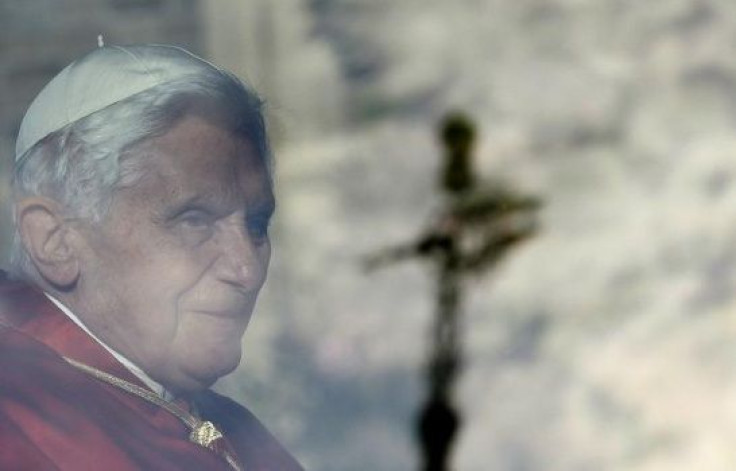Pope Benedict XVI Resigns: Do Western Catholics Really Even Care?

The unexpected resignation of Pope Benedict XVI due to infirmity and age has shocked the Catholic world, but given a plethora of statistics suggesting that church attendance in Western Europe and the U.S. has been falling for years. One must wonder if the turmoil in the Vatican means all that much to millions of Westerners who consider themselves nominal Catholics.
Consider first the shrinking numbers that the church is facing in the U.S.
According to the Center for Applied Research In the Apostolate (CARA), an affiliate of Georgetown University in Washington DC, the number of priests in the U.S. has declined from almost 59,000 in 1965 to just below 39,000 last year, while the number of parishes has remained about the same. Nearly 3,400 parishes do not have a resident priest now.
The number of Catholic elementary schools has plunged from about 8,414 in 1975 to 5,636 currently (in tandem with a sharp decrease in the number of students from 2.6 million to 1.4 million).
Meanwhile, Catholic secondary schools have seen their strength slashed from 1,624 to just above 1200 during that same period. The number of students at these facilities has been pruned to about 591,000 from 884,000.
All the while, the number of Americans who identify as “Catholic” has surged from 48.5-million to 78.2-million since 1965.
In 2009, the Gallup Poll released results of a poll indicating that regular (that is, weekly) church attendance by U.S. Catholics plummeted over the past six decades – from 75 percent in 1955 to 45 percent in 2008.
The latest figure matched the attendance percentages for U.S. Protestants – although, interestingly, Protestant numbers have held steady at the 40-percent-plus level since the mid-1950s.
Gallup noted that the bulk of the drop-off in Catholic Church attendance occurred between 1955 and 1975, then gradually declined at a slower rate until hitting the 45 percent level sometime in the mid-1990s – where it has remained since.
“That's an extremely important finding given the upheaval in the U.S. Roman Catholic Church caused by the sexual abuse scandals that erupted earlier this decade,” Gallup commented.
Prior to 1975, the sharp decline in Catholic attendance was largely driven by youths leaving the Church in droves, while elderly parishioners remained largely loyal.
By the mid-1970s, a little more than one-third (35 percent) of Catholics in their 20s attended church weekly, Gallup noted.
“The increasingly spare attendance at regular mass has been of considerable concern to the Catholic Church in the U.S. for some time,” Gallup stated.
“Theologians and other observers have variously offered the cultural upheaval of the 1960s, changes to the church brought about in the 1960s by the Second Vatican Council, and national publicity in 2002 over sexual abuse lawsuits against Catholic priests as possible contributors to the trend.”
Church attendance has also been falling across Europe for decades.
According to the European Social Survey, for a poll conducted in 2008 and 2009, a lack of attendance is extremely high (in excess of 50 percent) in the Czech Republic, France, Britain, Belgium and the Netherlands.
Regular church attendance was found most common in Croatia, Poland, Greece and Cyprus.
Even in the Republic of Ireland, which is so closely associated with the Catholic Church, churchgoing has plunged from 85 percent in 1975 to 60 percent in 2004.
"I don't go to church, and I don't know one person who does," Brian Kenny, a student at Dublin Business School, told USA Today.
However, a lack of church-going does not necessarily mean that U.S. Catholics have completely abandoned the church.
In December 2012, Pew Research reported that almost three-quarters (74 percent) of U.S. Catholics said they were “satisfied” with the leadership of the-then Pope.
However, it would appear that a good portion U.S. Catholics do not let their faith determine their political views.
A Pew poll in August 2012 (during the presidential campaign) suggested that about half (51 percent) of U.S Catholics supported incumbent president Barack Obama’s views on such divisive topics such as abortion and gay rights; while only about one-third (34 percent) supported the more conservatives views of challenger Mitt Romney. (These numbers tilted more in Romney’s favor when considering only regular church-going and older Catholics).
Terrence W. Tilley, professor of Catholic theology and chair of the theology department at Fordham University, notes that some 90 percent of U.S. Catholics disagree with the church’s view of contraception, while a very small portion (perhaps between 10 to 20 percent) could be considered hard-core Conservative adherents.
Other subjects are not quite so cut-and-dried.
With regards to abortion, one of the most contentious issues the church faces, Tilley noted that the majority of American Catholics believe abortions should be “safe, legal, but rarely used.”
Regarding the fast-rising Hispanic population in the U.S., Tilley explained that their emergence may not necessarily mean the restoration of 1950’s-type church attendance numbers.
“For many Hispanics, particularly those of Mexican and Cuban descent, the fidelity to church is somewhat different from the practices of the old Irish and Italian Catholics,” he said.
“Hispanics do not attend church regularly, and indeed, many have in recent years turned to Pentecostal churches.”
With respect to Benedict’s resignation, Tilley indicated that his act would contrast with the words of his predecessor Pope John Paul II, who, when asked if he would ever step down, replied “To whom would I submit my resignation?”
Benedict's resignation provides the answer: To the Church he serves.
Tilley does not think the College of Cardinals (who are dominated by Europeans, mostly Italians) would choose an American successor to Benedict, due largely to the poor image the US has globally.
If the Church picked a black successor, namely Cardinal Francis Arinze of Nigeria; or Cardinal Peter Kodwo Appiah Turkson of Ghana, Tilley replied the global reaction would be “wow.”
© Copyright IBTimes 2024. All rights reserved.











